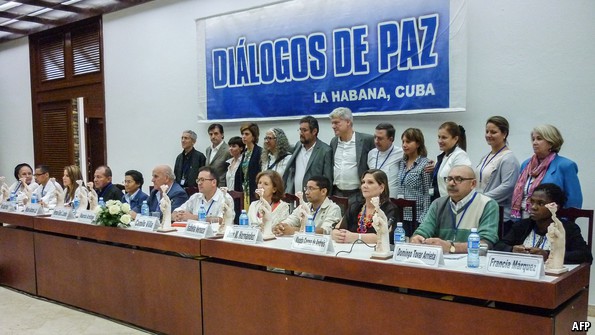Colombia
The FARC’s ceasefire
gambit
A good sign, though one that poses a dilemma for the
government
Dec 17th
2014

WHEN the FARC
guerrillas kidnapped an army general last month, peace negotiations with the
government that began two years ago seemed in jeopardy. Colombia’s president,
Juan Manuel Santos, responded by calling the FARC’s bluff: he suspended the
talks until the general’s release, which came two weeks later.
Now it is the FARC’s
turn to raise the stakes. On December 17th it declared a unilateral and
indefinite ceasefire. That in its way is historic. Previous ceasefires have
only been for short periods. In an announcement in Havana, where the peace
talks are being held, the guerrillas said the ceasefire would start on December
20th. They asked several international bodies, including the International
Committee of the Red Cross, to verify their compliance.
Many Colombians, weary
of a conflict that has lasted half a century, cheered the announcement. But it
is not quite the magnanimous gesture it may appear. Iván Márquez, the lead FARC
negotiator in the talks, said that the ceasefire would be called off if “our
guerrilla units have been the target of attack by the armed forces”.
By attaching that
condition, the FARC are trying to force the government to suspend hostilities
too. That is a demand that Mr Santos has refused time and again. The government
argues that a bilateral ceasefire would only give the guerrillas reprieve from
constant military operations against them, which they could use to rearm and
regroup, as they did during past, failed peace talks.
Although talking while
the fighting continues has sometimes strained the negotiations, these are far
more serious than their predecessors. The two sides have reached agreements on
the first three agenda items: rural development, political participation and
drug trafficking. They are now tackling the two most difficult points: justice
and reparations to victims; and the demobilisation, disarmament and
reintegration into society of former fighters.
When the talks resumed
earlier this month, both sides said they were seeking ways to de-escalate the
conflict. The FARC has now issued its proposal in that regard.
Mr Santos did not
immediately react. The government can hardly reject the FARC’s gesture but it
will have to weigh its response carefully. Suspending attacks on guerrilla
units would be tantamount to agreeing to the bilateral ceasefire which Mr
Santos has vowed not to declare. But the government could restrict the army to
a defensive stance.
It was surely by
coincidence that the FARC’s gambit came on the same day as the announcement
that the United States and Cuba are to restore diplomatic relations. The FARC
have never been beholden to Cuba, and their war has followed its own, tortured
logic. But the signs are that Colombia’s long conflict is drawing to a close. Times in the Americas are changing.
No comments:
Post a Comment